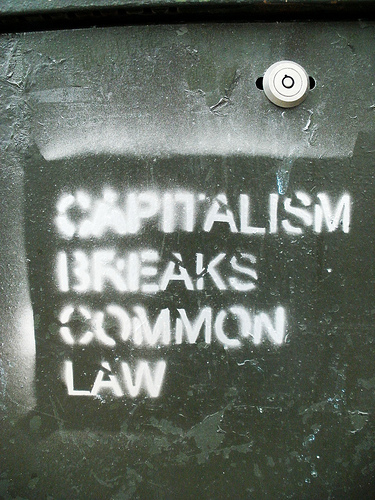Why isn't everyone dressed in amazing costumes and giving away food, gifts, back rubs, heartfelt hugs and compliments? Why can't I ride around on a giant mechanical octopus that shoots flames? How come nobody is dancing in the streets? Why do I have to *pay* for things? Why are people doing things they don't really want to do? Why is the default world so ridiculous, in the worst kind of way?
These were the burning questions that filled my mind and appeared on my Facebook page after my return from Black Rock City (more specifically, after unpacking, sleeping for what seemed like three days straight, and gradually recovering my capacity to think in a semi-logical fashion). I was having a hard time making sense of the default world and understanding why I should participate in it. Indeed, it struck me as exceptionally weird that anyone would want to take part in the mind-numbing, soul-crushing, earth-ravaging, life-denying enterprise called modern techno-industrial culture. Inasmuch as I was able to maintain a consistent thought, it was this: What, exactly, is the point of it all?
It didn’t help that my period of reintegration and recovery coincided with the Democratic National Convention, at which speaker after speaker spouted the same jingoistic affirmations of American exceptionalism and promises of economic revival. Although several folks acknowledged global warming as genuine threat, nobody seemed to understand that on a planet with finite resources, economic growth is the not the solution but the problem. As Chris Hedges points out in a recent article, to believe in continued economic expansion amidst continued ecological failure is to embrace a delusion–a pathological one, I might add.
The closest anyone came to speaking truth to power was when the economist and senatorial candidate Elizabeth Warren asserted that the system is rigged. She was referring, of course, to the unfair advantages enjoyed by the 1% through tax cuts and loopholes, corporate welfare and subsidies, full-time lobbyists, and the ability to purchase politicians and thus undermine our supposedly democratic system. But despite Warren’s candor–not to mention the sincerity of the FLOTUS, the warm vegan glow of Bill Clinton, and the usual confidence of the POTUS–no mention was made of capitalism as a whole being a rigged game that inevitably increases economic disparity between the haves and have-nots. Doubtless this would have quieted the chants of “USA!” and “Four More Years!” from those who seem to want a bigger slice of the American pie rather than a brand new recipe.
Then there was this CNN video clip of Tea Party chairperson Amy Kremer, who tried desperately to make the case that Obama doesn’t love America “the way we do” (the “we” apparently referred to conservative WASPs, although Kremer refused to clarify). Her central claim was that Obama has “a global…a global…oh, what’s the word?” She seemed to be groping for the word “perspective,” although she might have preferred the sinister-sounding term “agenda.” Eventually Kremer clarified that this one-world outlook of Obama represents an evil that cannot be tolerated. Evidently Romney and the Tea Partiers inhabit an alternate reality in which there exist multiple worlds–presumably red and blue, American and un-American, Christian and anti-Christian, freedom-loving and freedom-hating, etc. This myriad worlds notion might be laughable if it weren’t just a variation on the theme advanced by both parties that the earth can and must provide unlimited economic growth for the benefit of a single species–a small percentage of our species at that.
Apart from being delusional, proponents of this idea never bother to address the fundamental question posed earlier: What’s the point? Why is unlimited growth a good thing? The obvious answer that it can only be beneficial inasmuch as it contributes to human happiness, while the obvious realization is that it obviously isn’t working (and not just because the working class isn’t working). One need not consult the depressing statistics on depression; signs of unhappiness are painfully apparent everywhere. Indeed one of the biggest challenges of my return from Burning Man was precisely this realization that very few people in the default world seemed genuinely happy.
Not that I was particularly surprised, having experienced this aspect of culture shock many times now, whether post-Burn, after each of many voyages abroad, or in the wake of various inner journeys. In fact, my contention is that the current global system–let’s call it Calvinist corporate capitalism–not only fails to foster human happiness, it is actively antagonistic to it. If you happen to be happy, it isn’t because of the system but despite it; you have managed to avoid being indoctrinated and infected with the addictive grasping after more and more–more money, more possessions, more power, more pleasure, more praise. Perhaps you’ve learned that the “pursuit of happiness” is an oxymoron, that contentment (not bland “good enoughness” but scintillating joy) is not something to chase after but to allow. It does not exist somewhere in the future and cannot be found out on the ever-receding horizon of “progress,” but can only happen in the here and now.
Despite all the recent books and expensive seminars on the subject, happiness is actually quite simple. The primary components are decent health, a sense of security, of community, and of meaning. Unfortunately, all of these basic human aspirations are thwarted by global capitalism, which feeds us GMO and junk food, promotes warfare and competition above human welfare and peace, converts natural wealth into “goods” and connection into commodity (i.e. “services”), and defines individual purpose as the capacity to consume or otherwise contribute to GDP. By contrast, Burning Man strengthens community and trust through cooperation and gifting. By providing a break from corporate culture and advertising, it allows us to see that the American dream is indeed an empty fantasy, mainly because life is more about giving than getting. Last but certainly not least, Burning Man reminds us that nothing is permanent.
So if you’ve been wondering why all those dusty people in all those Facebook pictures are smiling like there’s no tomorrow, it’s because in that world–dare I say the real world–there isn’t.
Darrin Drda is a Bay Area-based artist, musician, and author of The Four Global Truths: Awakening to the Peril and Promise of Our Times. He will be touring the East Coast at the end of September, with stops in New York City, Baltimore, DC, Philadelphia, and Richmond, VA. For more info, please visit www.thefourglobaltruths.com.
Image by Feral78, courtesy of Creative Commons licensing.













